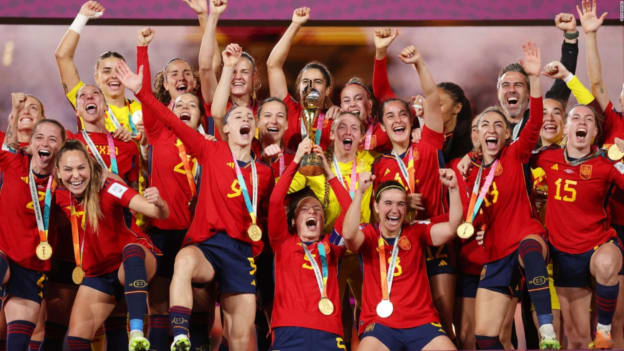Spain's Women's World Cup win - A triumph of talent & courage

Spain's victory in the Women's World Cup final isn't just about soccer; it's a lesson on the incredible synergy of talent and courage.
Winning a World Cup demands star players, teamwork, supportive management, and inclusive leadership, Spain's victory shows that missing ingredients can't defeat talent and sheer determination.
A journey of challenges
Spain's journey to the World Cup final wasn't easy. Key players in the team confronted their coach and federation, raising concerns of mistreatment and leading to a withdrawal from the national team. They decried inadequate facilities, subpar treatment compared to their male counterparts, and a hostile work environment. Despite some minor changes, the response was hardly transformative.
The unyielding spirit
How then did Spain emerge victorious, outscoring other teams with unmatched determination?
The answer is talent. Spain showcased an unparalleled ability to excel on the field, irrespective of the off-field turmoil. The nation's rich talent pool, nurtured over decades, became the driving force.
Reflecting back, a convergence of factors facilitated Spain's journey, offering essential lessons on the power of talent. Over the past 15 years, a societal shift has shattered gender barriers, pushing more girls to engage in traditionally male-dominated activities. From 2003 to 2018, registered female soccer players in Spain quadrupled. This wave brought improved coaching, better facilities, and more opportunities for girls in sports. Simultaneously, clubs took the lead in professionalising women's teams. Barcelona pioneered by providing young female players access to top-tier training via its youth academy and investing heavily in its senior women's team. Other clubs followed suit, elevating Spain's player pool to among the best in the sport.
This trend isn't confined to Spain alone. The Women's World Cup showcased a global surge of talent. Although the funding and attention from sponsors and broadcasters still lag behind the men's game, the momentum is palpable.
A catalytic force
While we celebrate these advancements, it's essential to acknowledge the persisting challenges in creating professional, inclusive, and safe environments for women. As Nadia Tronchoni, an editor at El País, Spain's largest newspaper, articulated, this victory signifies “more than a title”. “The women, and the girls of this country celebrated the fact that our stubbornness has finally defeated machismo,” she said. It symbolises the triumph of resilience over gender bias.
A pitch to invest in women
As former head of women's football at FC Barcelona, Maria Teixidor expressed, the triumph of these players amid their challenges underscores the critical importance of investing in women.
“This success, despite all the hard moments these players have been through, shows how important it is to invest in women. To invest not only money; but mostly time in listening to them, in providing for their specific needs, in adapting to make them thrive, in helping build their own skills and leadership. It’s all about sharing and giving and compromising. Then, results come, as it has been shown. I couldn’t be happier.”
But can raw talent alone dismantle entrenched norms from within? As talented women continue to rise in various domains, can their influence catalyse a profound shift towards more inclusive and secure work environments?
The path ahead, though promising, is lengthy. Spain's victory in the Women's World Cup final isn't just about soccer; it's a lesson in how talent and bravery can overcome old ways.
















